Virginia real estate taxation is a sham.
Properties are “reassessed” by local government on a regular schedule, as mandated by state law, most often and historically leading to higher tax bills.
The practice of real estate taxation, generally, insures that no person ever truly owns his property (try not paying real estate taxes and see how long the property remains yours). However, landowners in the Commonwealth are particularly susceptible to fraudulent assessment policies and incompetent or sloppy assessors.
The City of Charlottesville is a prime example of both.
Over the years, allegations of collusion between the City Manager’s office and the Assessor’s office have arisen, and speculation abounds regarding the relationship between the City Manager’s annual stated financial resource “needs” and the historical annual rise in Charlottesville assessments.
In spite of experiencing one of the worst years in decades for local property values, miraculously, average Charlottesville assessments for existing residential property declined by only 2.19%—a figure hardly believable when looking at the dramatic value reductions of Central Virginia residential properties from 2008 to 2009 as indicated by sales statistics.
A report from the regional Multiple Listing Service (MLS) shows that in 2008, the median value of all sold residential properties in Charlottesville was $265,508.
For 2009, the MLS report indicates that the median value for Charlottesville’s sold residential properties fell to $246,500—a drop of 7.2% from the previous year. This number deviates from the Charlottesville Assessor’s figure (down 2.19%) by more than 325%!
How could the Assessor be so disconnected from market reality?
An analysis of selected Charlottesville residential properties (sold from the final quarter of 2009 and into early 2010) netted dozens with substantial over-assessments based on the sales price—two of which were assessed AND taxed at nearly 300% of their eventual sales price. See the chart below:
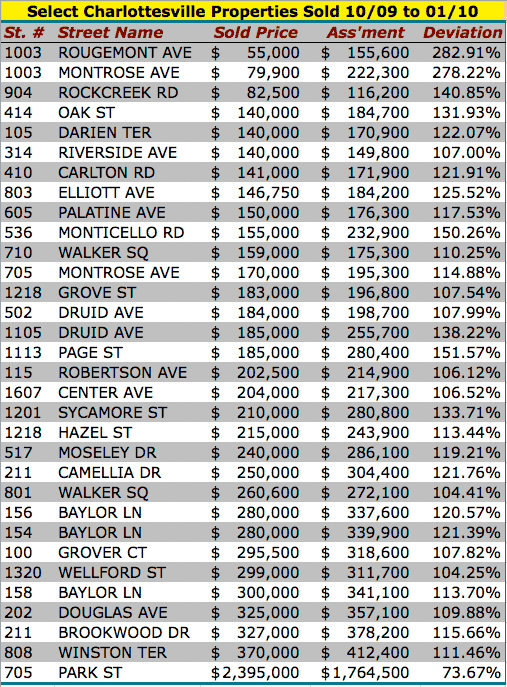
An additional analysis of selected Charlottesville residential properties currently for sale (as of 02/2010) shows dozens more properties listed at prices substantially below their assessed value, and yet these remain unsold—an indication of vast over-assessment. See the chart below:
What practically thinking homeowner would challenge an assessment on a home currently listed for sale? Probably none. Why? Because many home buyers and real estate agents will cross-reference a home’s list price with the City’s assessed value. Although only tangentially related, the perception is that a lower assessment means a lower home value to most buyers. Therefore, no seller in his right mind will ask for a reduction in the property’s value while the home is on the market or if a sale is being contemplated.
Charlottesville Assessor, Roosevelt Barbour, Jr. said it directly in a recent interview when he stated, “You don’t want to pay taxes but you don’t want to lose value on your property either.” Barbour knows the game, and he plays it well. The threat is implicit but very clear.
Beyond these documented problems with the current system and its questionable results, there is additional “voodoo” in Charlottesville’s assessment process.
Unlike past years, when Charlottesville City spokesperson Ric Barrick released assessment figures delineated by neighborhood, this year Barrick and his City Hall cohorts kept that information a secret; suspiciously, they did not release it broadly to local media. Those unreleased figures are shown in the chart below:
While certain property types apparently are not valued by neighborhood location (i.e. duplexes), other Charlottesville properties are assessed by 43 capriciously drawn and seemingly liquid “neighborhood” boundaries, heretofore unreleased to the general public. See the map below:
On a whim, or otherwise, the Assessor chooses a relatively tiny neighborhood universe in which to compare values of “like” properties. In previous years, homes moved arbitrarily from one Charlottesville assessment neighborhood to another by the City Assessor saw inordinate increases in tax bills with no appurtenant increase in actual property values.
Locally and statewide, the system is broken and suborned, no doubt. And, it does not appear that political will exists to remedy the corruption and incompetence inherent in Virginia’s (or Charlottesville’s) assessment determination process.
Until a political hero in the mold of Howard Jarvis emerges to lead a real estate tax revolt in the Commonwealth, a property owner’s only defense is careful scrutiny of real estate tax bills. In spite of expressed and implied threats from Assessors’ offices, citizens must courageously challenge errant and aberrant assessments.
As for Charlottesville—cronyism, malfeasance, obfuscation, and single-party (Democrat) rule in City Hall virtually guaranty continuation of an annual fleecing of citizens at the hands of their own government via bogus and inflated real estate assessment. Baaaaaaahhh.




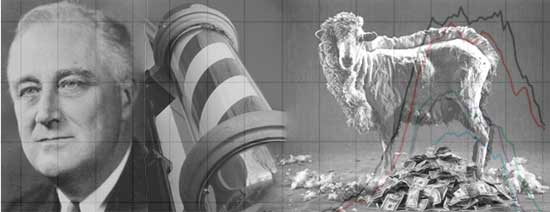
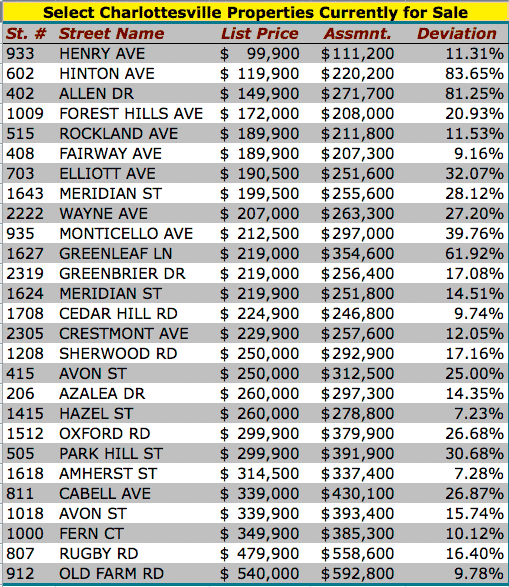
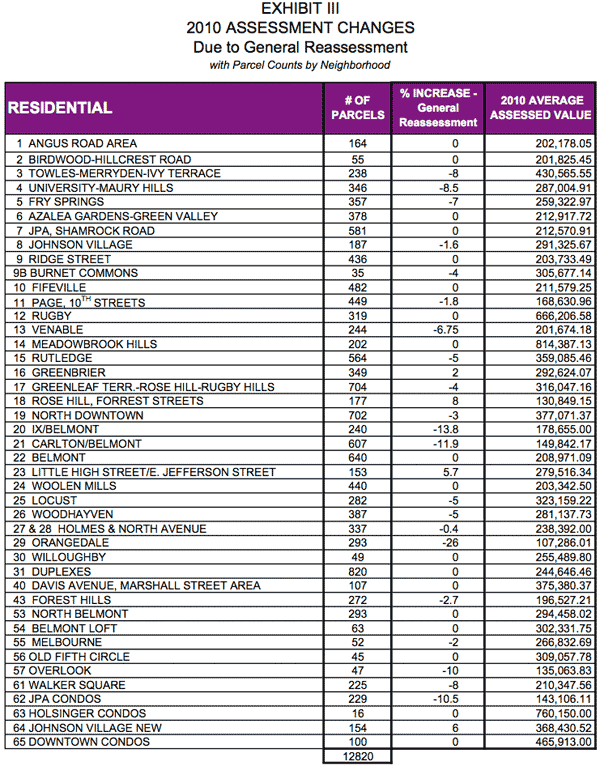
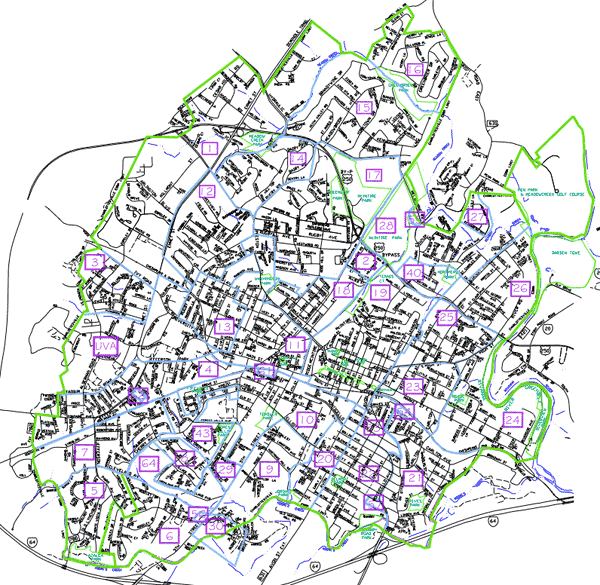

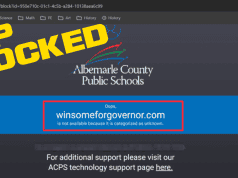
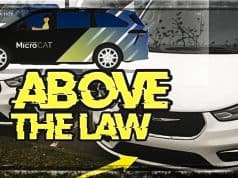
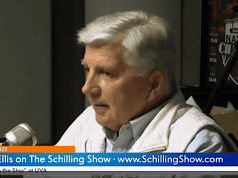
[…] corruption of Charlottesville’s assessment process and resulting outcomes has been documented here, and the City Manager played a large part in allowing residents’ taxes to spin wildly out of […]
[…] of the job and there should be no quarter for such occasional jeremiads. The comfortable cushion of rising assessments and the jurisdictions’ duplicitous intra-governmental tax-sharing agreements have combined to […]
[…] a time when many Charlottesville homes are demonstrably over assessed relative to their actual market […]